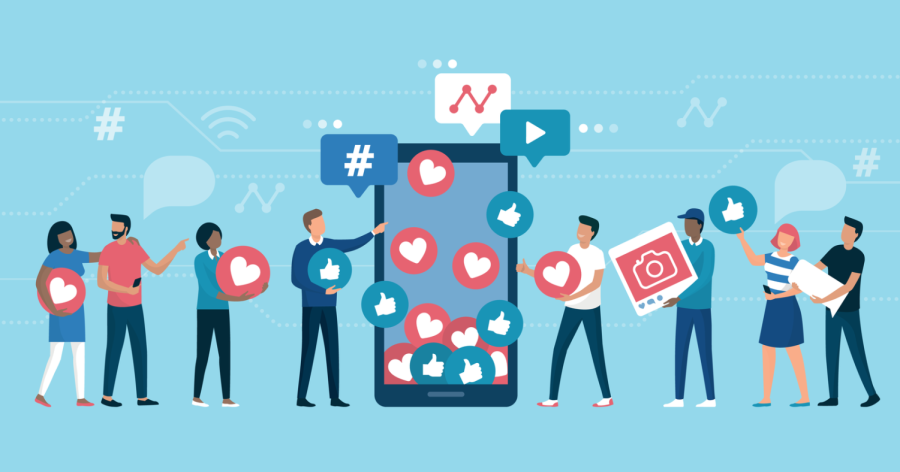Social media causes loss of identity
Social media thrives on comparison, making a strong sense of self elusive
Courtesy of Search Engine Journal
People end up shaping their identity around fabricated posts, which inevitably leads to disappointment.
January 20, 2022
College students tend to focus a lot on who they are becoming — we spend so much time thinking about this that we start to see our self-identity as something that we can change. Some would argue that this tendency to express ourselves in a selective way is a part of our nature.
I would argue, however, that this mutable sense of self has been exacerbated by media companies that have turned a profit by co-opting people’s lives and insecurities — especially the lives of college students.
College is a time in which people find out who they are. We move out of our parents’ house and our family’s shadow in order to try to develop our own sense of self. Entering freshman year, we discover what we like, what we hate, what motivates us and what doesn’t. College can be an amazing time to figure out the trajectory of one’s life, but sometimes this path is altered when survival instincts kick in and tell us that success lies in doing what everyone else is doing. We then start to conform to what the people around us are doing, because being in a group provides belonging, strength and improved wellbeing.
This has been the case throughout history, making self-identity rather elusive. However, companies like Meta and Twitter have amplified this beyond measure. Now, with the click of a button, people can see what everyone in the world is doing, allowing them to compare themselves to others every minute of every day. People see others posting the positive aspects of their lives only, making them feel as if they are doing something wrong and need to change something about themselves.
There is a more subtle phenomenon occurring within our social media feeds — other than an increase in division and lessening of wellbeing — a loss of our sense of self.
People wonder why it is so easy for a person to lose themselves in a group, whether it be a political party or extremist ideologies like Q-Anon and ANTIFA. It is because we have become so addicted to what our feeds are putting on our screen, that we forget who we are and mold our identity to whatever the algorithms show us. AI recognizes the posts you interact with and presents suggestions based on their content. Oftentimes, you don’t even have to interact with the post — algorithms have become so advanced that they can measure how long you pause on a certain post compared to other posts.
It’s easy to understand how a student at a school like Wake Forest might think that success can only be found by doing what their friends are doing — the same friends who seem to have their life figured out based on their Instagram grid. The truth is, people end up shaping their identity around fabricated posts, which inevitably leads to disappointment.
But this does not deter people from continuing to go on social media — the disappointment then creates a never-ending cycle of trying to find the next thing that will make their life better. It is hard to stomach the fact that many people in our society — especially college students who account for a large percentage of social media users — are addicted to their feeds. Social media addiction is generally not compared to drug use, but there are similarities that cannot be overlooked.
An addict is someone whose identity starts to change as they use drugs, doing whatever they can to chase the next high. Social media has replicated this effect in most of the population. If we don’t act now, we will find ourselves losing our identity, becoming a face in the masses that companies manipulate for their ads.
I encourage you to examine how often you are comparing yourselves to others, so that you don’t end up losing the things that make you who you are.
I want to close with a thought from the show “Mr. Robot”, which posits that “changing the world [is] just about being here, by showing up no matter how many times we get told we don’t belong … if we refuse to budge and fall in line … the world can’t help but change around us.” Don’t let the media co-opt your life. Change the world by being you.















Lonnie Blake Owens • Nov 24, 2022 at 12:05 am
It used to be true if you turned off the TV the problem went away. Now people cannot even answer the phone.